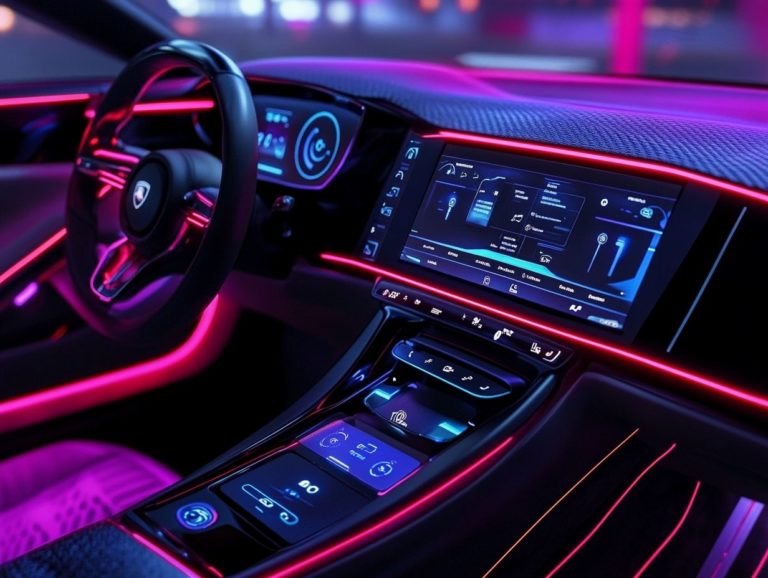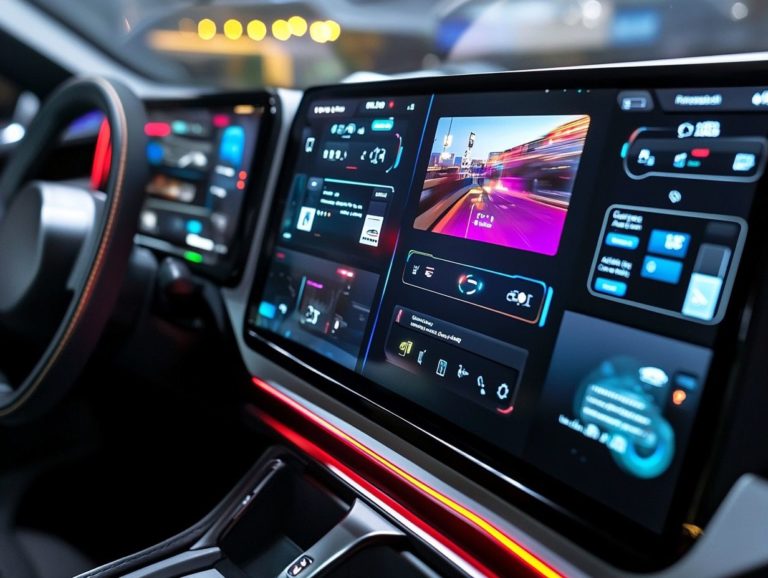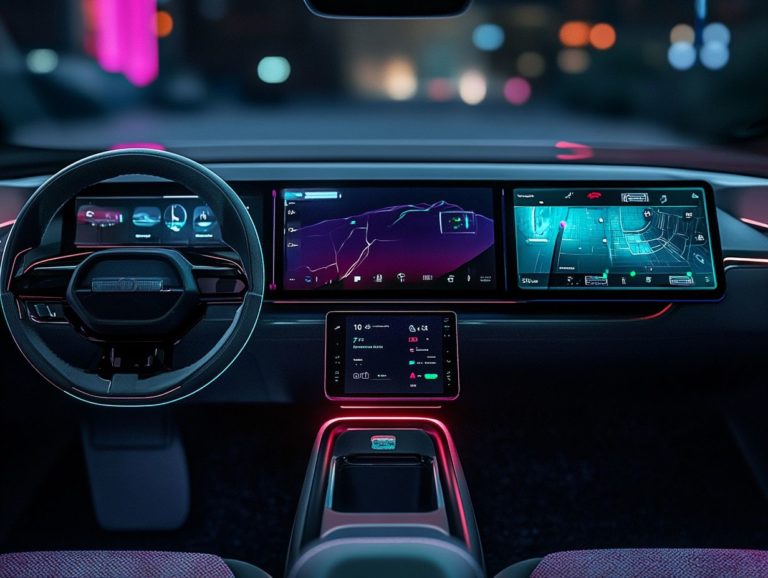Comparing Performance Features in Electric Cars
Electric cars are revolutionizing your perspective on transportation, merging sustainability with cutting-edge technology.
As you contemplate making the switch, grasping the performance aspects that distinguish these vehicles is crucial. Every detail counts from battery range and charging times to acceleration and overall driving experience.
This guide helps you explore the leading electric car models, empowering you to evaluate your preferences, budget, and environmental impact. With this knowledge, you can make an informed decision about your next vehicle.
Contents
- Key Takeaways:
- Performance Features to Consider
- Comparing Different Electric Car Models
- Factors to Consider When Choosing an Electric Car
- Frequently Asked Questions
- What are the top performance features to consider when comparing electric cars?
- How does acceleration differ between electric cars and traditional gasoline cars?
- Is the range of an electric car comparable to a traditional car’s fuel range?
- Does battery life affect the performance of an electric car?
- How long does it take to charge an electric car compared to filling up a traditional car with gas?
- Which performance feature is most important when choosing an electric car?
Key Takeaways:
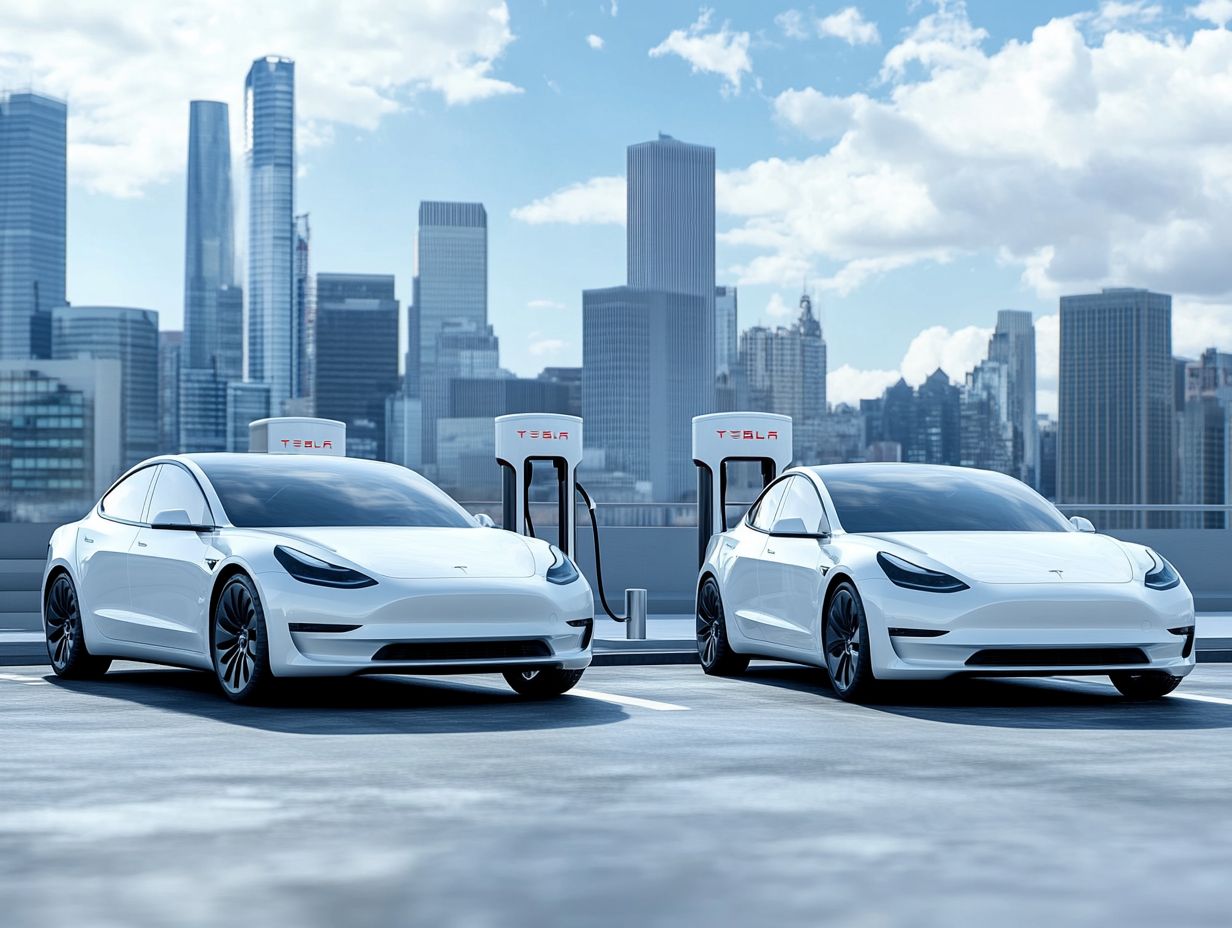
- Battery range and charging time are crucial factors when comparing electric cars, as they determine how far you can go on a single charge and how long it takes to recharge.
- Acceleration and top speed may not be vital for daily use, but they greatly impact the driving experience and overall performance of an electric car.
- When choosing an electric car, consider your needs and preferences, the budget, long-term ownership costs, and the vehicle’s environmental impact.
Overview of Electric Cars and Their Benefits
Electric cars, or electric vehicles (EVs), are transforming the automotive landscape, providing numerous benefits for your eco-conscious side and your practicality. Standout models like the Tesla Model Y, Hyundai Kona, and Nissan Leaf are gaining traction.
The focus is now on zero-emissions commuting, which reduces air pollution and maximizes energy efficiency. As you look ahead to 2024, expect to encounter EVs with cutting-edge technology that enhances their appeal, paving the way for broader adoption.
These vehicles play a vital role in reducing greenhouse gas emissions, making them essential in the fight against climate change. Plus, long-term savings on fuel and maintenance make them an attractive option for budget-savvy buyers.
Take the Ford Mustang Mach-E, for instance. It showcases impressive range capabilities and comes loaded with advanced tech features, including a sophisticated infotainment system and over-the-air updates that elevate your driving experience.
As the automotive industry innovates and expands charging infrastructure, the transition to electric vehicles is turning sustainable transportation into a lasting reality.
Performance Features to Consider
When evaluating electric cars, understanding how to compare car performance specs is crucial, as it significantly influences your overall driving experience and satisfaction.
Pay close attention to key aspects like powertrain performance. Cars with two motors often deliver better acceleration (how quickly they speed up) and handling (how well they respond while turning). To delve deeper, check out understanding feature differences in electric models to consider how efficiently the electric powertrain works, as this directly impacts both range and effectiveness.
Moreover, advanced driver aid technologies boost safety and convenience, making today s electric vehicles more appealing than ever.
Battery Range and Charging Time
Battery range and charging time are essential in your decision-making process as a potential electric car buyer. Thanks to improvements in battery technology, many manufacturers now offer long-range electric vehicles that can exceed 300 miles. With robust charging networks like Tesla’s Supercharger network, reliable charging options are available during your journeys.
These enhancements elevate your overall driving experience and help ease common range anxiety, boosting your confidence as a consumer. The integration of fast-charging solutions has minimized downtime, making it easier for you to incorporate EVs into your daily routine.
As charging infrastructure continues to expand and improve, charging speed will significantly influence your purchasing decisions. With better range and faster charging capabilities, you re likely to view electric vehicles as a viable alternative to traditional gasoline-powered cars, making the switch an exciting prospect.
Dive into the world of electric vehicles today and find the perfect fit for your lifestyle!
Acceleration and Top Speed
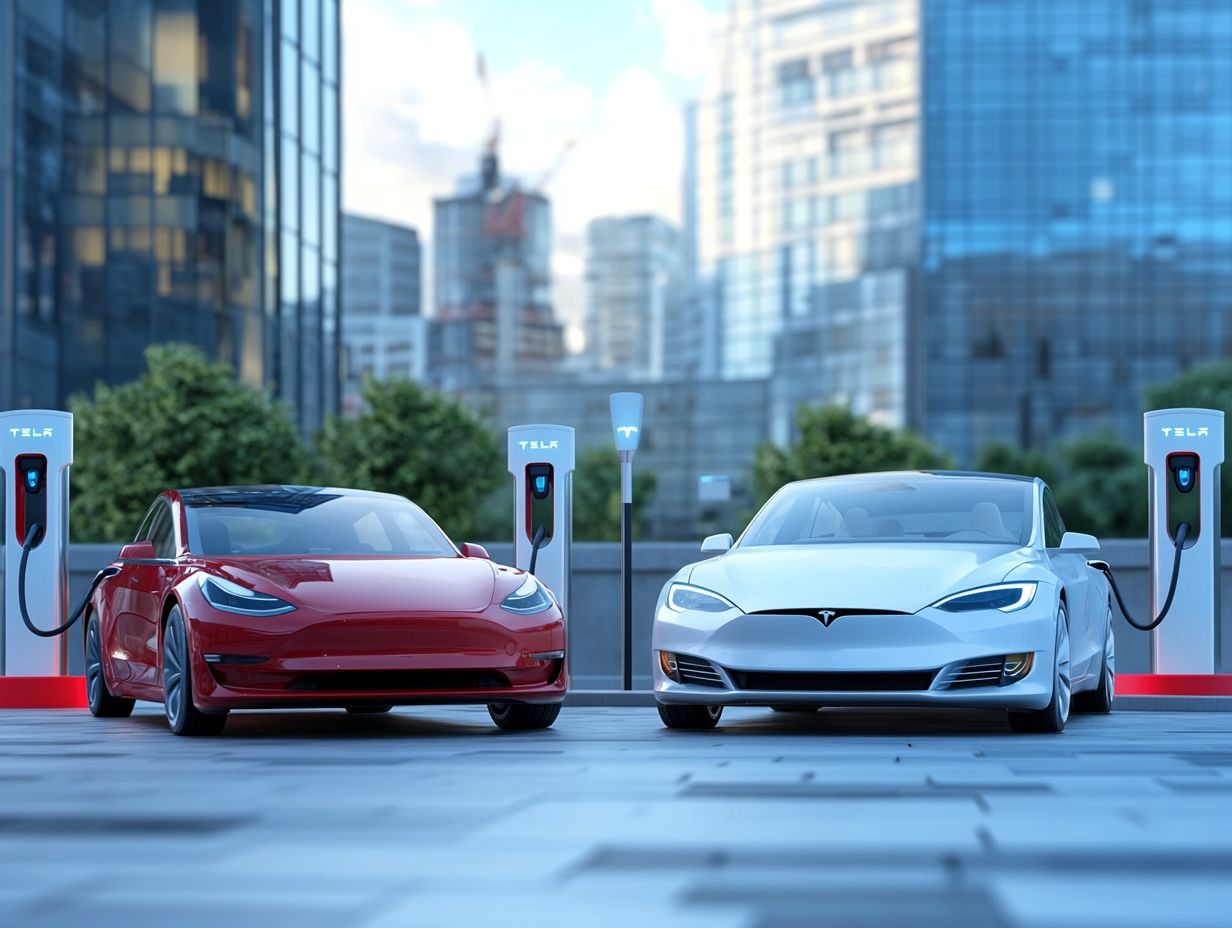
Acceleration and top speed show what an electric car can really do. For example, the Tesla Model S and Rivian feature impressive acceleration, especially in their dual-motor models, making it essential to know the key features to compare in cars.
The Model S boasts a jaw-dropping 0 to 60 mph in just 2.4 seconds. The Rivian R1T is slightly less nimble but still showcases remarkable speed and off-road versatility.
The electric vehicle market is transforming. Speed and sustainability are captivating automotive enthusiasts who want thrilling experiences without sacrificing their values.
Handling and Driving Experience
How you handle an electric vehicle influences your driving pleasure. Thanks to advancements in electric technology, cars like the Porsche Taycan and BMW i7 offer precise steering and a connected feel.
This is due to optimized weight distribution, a key feature of electric cars that lowers the center of gravity. This design enhances cornering ability and stability, setting them apart from traditional cars.
The Rivian R1T excels in off-road handling, while the Tesla Model S combines swift acceleration with agility. For a deeper understanding of the differences between these vehicles, check out the feature analysis: gas vs. electric vehicle features. As manufacturers innovate, electric driving experiences vary from sporty to luxurious.
Comparing Different Electric Car Models
Finding the right electric car is crucial for your needs. With so many options available, you can explore a range of vehicles from leading brands like Tesla, Hyundai, and the best electric cars for performance enthusiasts such as Lucid Air.
Whether you seek high performance, luxurious comfort, or affordability, there s a perfect match waiting for you.
Top Electric Cars on the Market
The electric car market is booming, and you won t want to miss these top models! The Tesla Model Y, Hyundai Kona, and Nissan Leaf lead the charge with outstanding range and features.
The Tesla Model Y offers up to 330 miles of range, making it a fantastic family SUV. Meanwhile, the Hyundai Kona Electric combines compact design with quick charging and a user-friendly system at a competitive price.
The Nissan Leaf continues to shine with its affordability and practical range, ideal for newcomers to electric driving. Each option not only meets modern driver needs but also supports a greener future.
Factors to Consider When Choosing an Electric Car
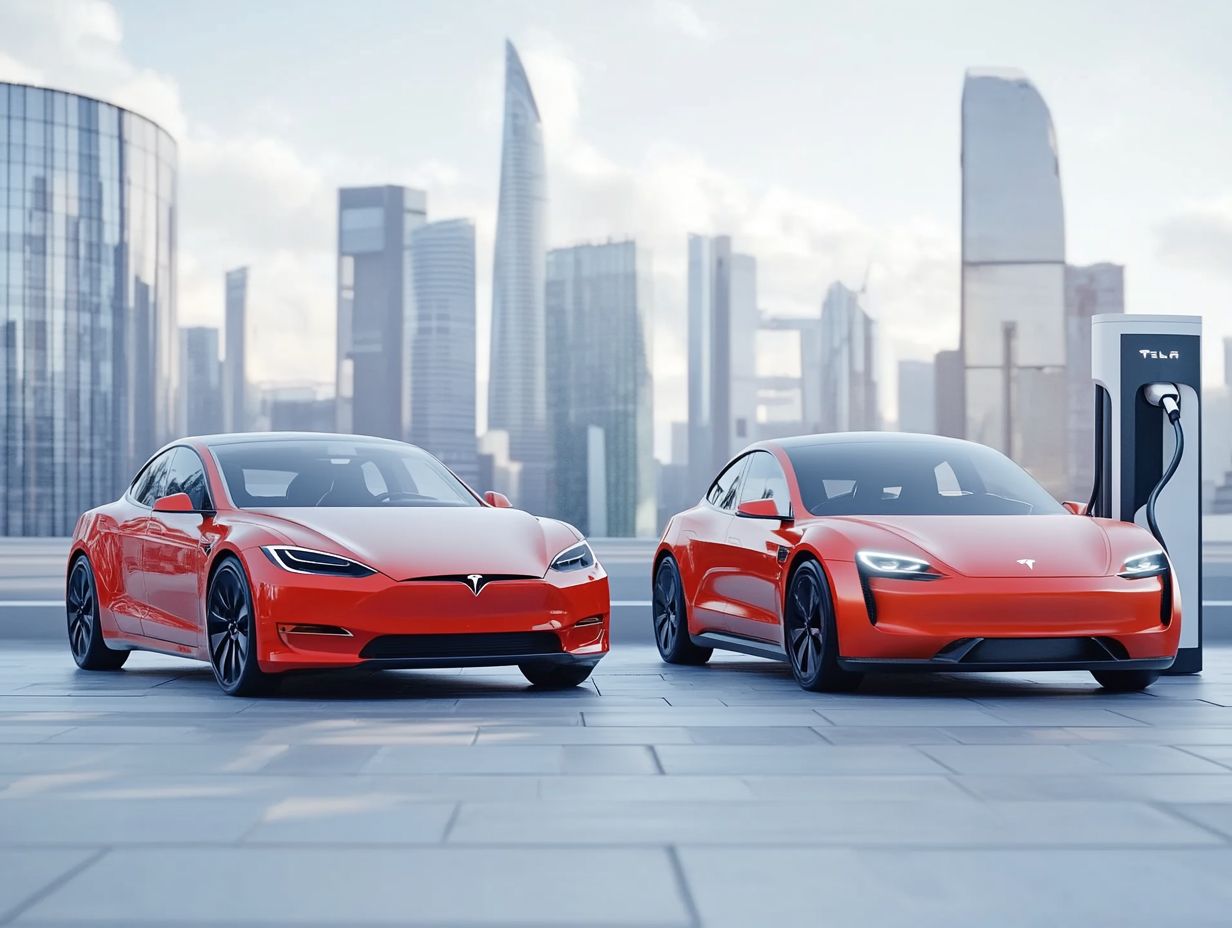
Selecting the ideal electric car requires thoughtful consideration of various factors that align with your personal needs, budget, and lifestyle. You should also weigh the environmental impact of your choice.
Each buyer has distinct preferences. Whether you seek the pinnacle of electric vehicle excellence or a more budget-friendly option that fulfills your essential criteria, it’s crucial to find a match that resonates with your values and aspirations. To help in this process, consider how to compare car brands for performance.
Personal Needs and Preferences
Understanding your personal needs and preferences is essential when choosing an electric car. Your driving habits and family requirements will greatly influence your selection. If you’re after a compact vehicle like the Hyundai Kona or a roomy electric SUV, aligning your preferences with available options can elevate your ownership experience.
For example, if you live in the city, you might prioritize a smaller model with superb maneuverability and convenient charging options. Something like the Nissan Leaf could be perfect for its urban-friendly features.
If you have a larger family, an electric SUV like the Tesla Model Y might be your best bet. It offers generous space for passengers and cargo, along with cutting-edge safety features.
If your daily commute involves long trips, consider a vehicle with a longer range, such as the Ford Mustang Mach-E. Ultimately, your lifestyle drives the decision, ensuring that the electric car you select is the perfect fit for your unique driving habits.
Budget and Cost of Ownership
Budget and cost of ownership are important factors to consider when you’re in the market for an electric car. These can vary significantly across different models and brands. While some budget-friendly electric cars deliver remarkable value, it’s essential to understand the details of financing options, insurance, and maintenance costs to make an informed choice.
Don’t forget about the upfront purchase price. You should also assess long-term expenses, such as charging costs, which can be considerably lower than traditional fuel prices, depending on your local electricity rates. Many regions offer enticing tax incentives or rebates, which enhance the overall cost of ownership.
Don t overlook potential savings on maintenance. Electric vehicles typically have fewer moving parts, leading to significant savings over time. By evaluating these financial considerations comprehensively, you can find the right balance between your initial investment and ongoing costs.
Environmental Impact
The environmental impact of electric vehicles plays an important role in your choices, especially if you’re committed to zero-emissions commuting and sustainability. Electric cars produce no tailpipe emissions, so you re actively contributing to the reduction of air pollution and overall greenhouse gas emissions.
When you charge your vehicle using renewable energy sources, you’re not just driving an electric car; you’re boosting its green credentials and fostering a positive impact on cleaner energy production.
Your transportation decisions extend beyond personal convenience they influence ecosystem health, urban air quality, and even climate change. Embracing electric mobility decreases reliance on fossil fuels and aligns with global sustainability efforts. This shift encourages advancements in technology and infrastructure, making green alternatives more accessible for everyone.
This collective awareness is reshaping markets and motivating you to prioritize environmentally friendly options. It paves the way for a future where ecological considerations take center stage in consumer decisions.
Frequently Asked Questions
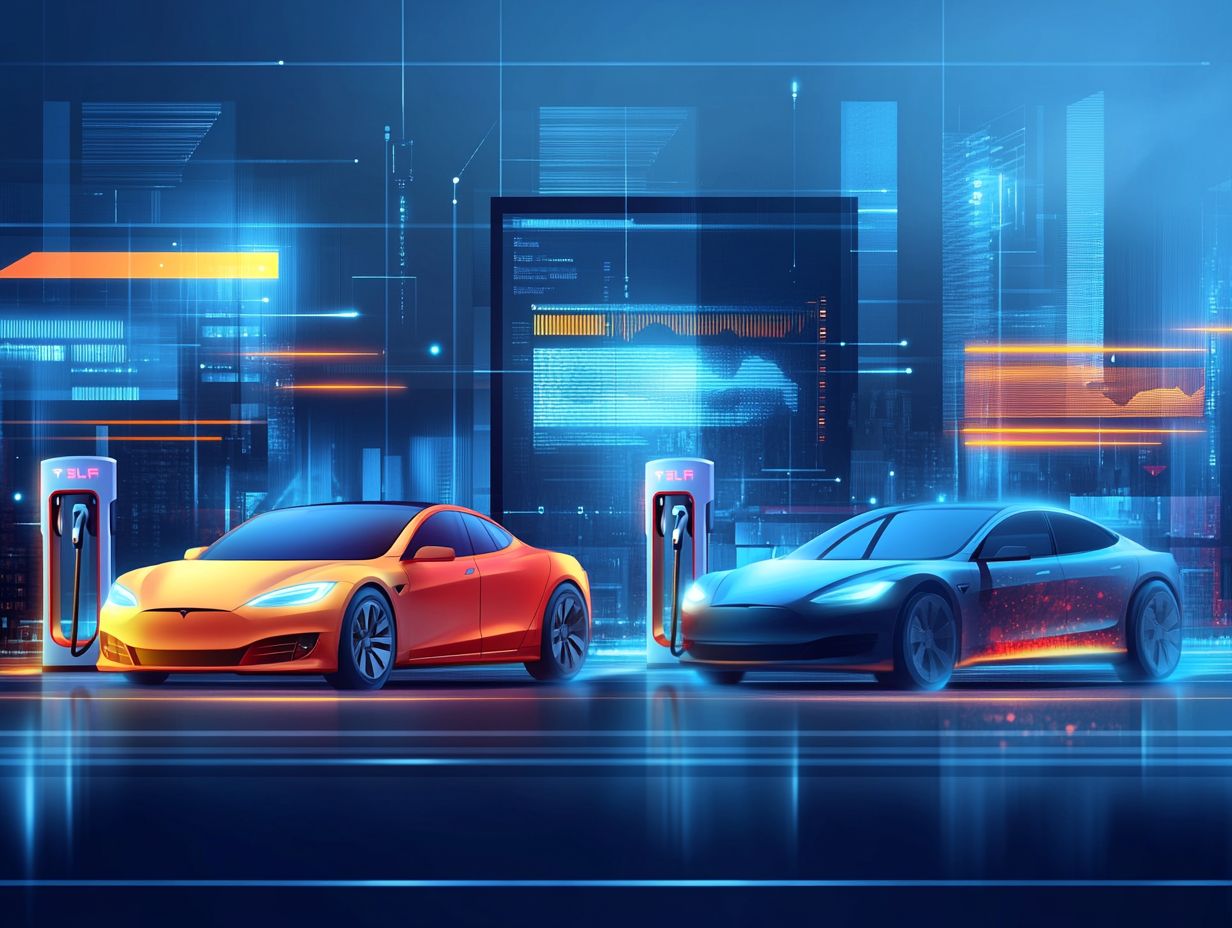
Explore our FAQs to find answers to your burning questions about electric vehicles!
What are the top performance features to consider when comparing electric cars?
When comparing electric cars, important features include acceleration, range, battery life, and charging time.
Also consider handling and the overall driving experience.
How does acceleration differ between electric cars and traditional gasoline cars?
Electric cars accelerate faster because they have instant power from their electric motors.
Is the range of an electric car comparable to a traditional car’s fuel range?
The range varies by make and model but is often similar to that of traditional cars.
However, you may need to charge electric cars more frequently.
Does battery life affect the performance of an electric car?
Yes, battery life is crucial for performance.
A well-maintained battery ensures better acceleration and range, while a worn-out battery can hurt performance.
How long does it take to charge an electric car compared to filling up a traditional car with gas?
Charging time depends on the charger type and battery size.
On average, charging an electric car takes longer than filling a gas tank.
Which performance feature is most important when choosing an electric car?
This depends on personal preference, but many people find battery life and range to be the most important factors.


